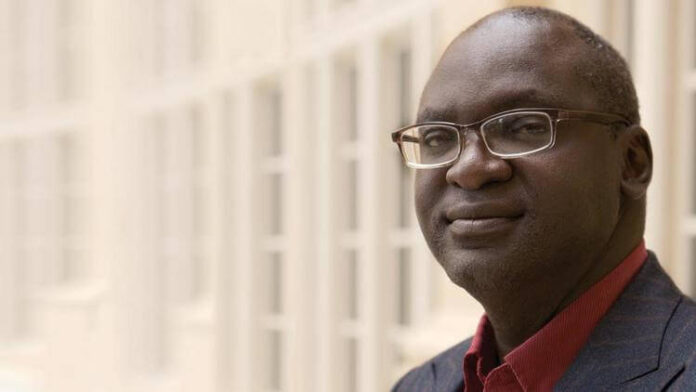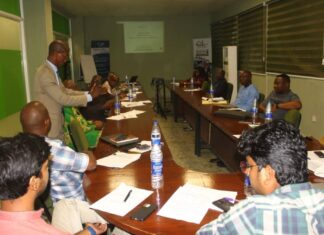Abacha victim Ogebe asks US court not to encourage injustice
By Jeph Ajobaju, Chief Copy Editor
A prominent victim of Sani Abacha’s human rights abuses has filed a lawsuit in the United States to stop the repatriation of Abacha’s loot to the Bagudu family and urging it to consider Nigerian victims instead.
Emmanuel Ogebe, a human rights lawyer who was abducted and tortured in Aso Rock by Abacha’s killer squad in the 1990s, filed an Amicus brief in the US District Court in Washington.
Part of the motion reads:
Motion for leave to file an Amicus Curiae brief
Now comes Movant with a motion seeking leave to file a brief in the above matter to aid the court in the resolution of this intractable litigation. Movant also respectfully seeks leave to file said Amicus Brief out of time due to exigent circumstances. Pursuant to above, Movant/Amicus states thus:
1. In November, 2022, Plaintiff, the United States of America, and Claimant, Ibrahim Bagudu filed a joint status report asking the Court to provide the parties additional time to complete their settlement, in continuation of a multi-year stay currently in effect, in a decade-long litigation over a quarter century old crime.
This is indicative of the complexity of this multi-national matter which this Amicus brief attempts to attenuate.
2. Parties also advised that “Plaintiff has retained UK counsel and conferred on multiple occasions with its government counterparts in the UK and Federal Republic of Nigeria, while Claimant has been consulting with UK counsel for other impacted parties (i.e. counsel for Governor Abubakar Bagudu, the Blue Holdings Companies, and beneficiaries of the Blue Family Trusts).”
This is indicative of the existence of multifarious non-party impacted actors whose interests are at stake – some of whom this Amicus brief will highlight.
3. Movant/Amicus is a barrister and solicitor of the Supreme Court of Nigeria of over 30 years good standing and the first to be licensed as a Special Legal Consultant on Nigeria by the Washington DC Bar two decades ago.
As a top US-Nigeria Affairs expert who has testified in the US and Canadian parliaments and courts as well as advised UK parliament, amongst others, Movant/Amicus is eminently placed to speak as an Amicus Curiae. Amicus has testified and made recommendations about the defendant funds in the US Congress and also co-drafted several bills on this subject.
4. Movant/Amicus was abducted, unlawfully detained and tortured by Abacha’s killer squad as a young human rights lawyer and prodemocracy activist forcing his exile to the USA over 25 years ago.
As a victim of Abacha’s brutal misrule, Movant/Amicus is amongst the class of victims of horrendous human rights abuses who never got justice or compensation and therefore have an interest in the disposition of the “Abacha loot” (aka the defendant assets) in this case. An Amicus brief gives voice to marginalized victims.
5. The defendant funds were looted from Nigeria and her citizens but the interests of the citizens of Nigeria have not been assiduously represented in this matter due to non-cooperation by the Nigerian government in the forfeiture process. An Amicus brief will help elucidate and mitigate this anomaly.
6. The court finds itself in the unenviable conundrum of being asked to return millions looted from a poor Africa nation, which is the poverty capital of the world, to those behind what was at the time the largest grand larceny in the world – a quarter century later. An Amicus brief will help ameliorate this travesty and unburden the court.
7. This Amicus brief provides relevant facts, perspective, moral clarity and critical guidance for the court to effect optimal justice in resolving this case, speedily and equitably, that have not been previously canvassed.
8. Amicus has not been funded by any party or any other in this filing nor received drafting assistance. Amicus does not side with either party as Amicus brief is not predicated on the numerous filings in the docket over the past decade. Rather it is premised largely on expertise and monitoring of these issues over time.
9. Parties are not prejudiced by this motion as the matter has been in a state of animated suspension for several years and Claimant continues to draw an annuity from the defendant funds regardless, from all accounts.
10. The proposed Amicus brief is annexed hereto and is within the word count limit.
Whereof, Movant/Amicus respectfully asks that the court grant leave for this Amicus brief to be filed and that it be deemed filed timeously pursuant to Rule 29.
________________________________________________________________
Related articles:
Ogebe wins case against Wall Street Journal at US Appeal Court
US activist abused for wearing “Free Leah Sharibu” T-shirt at Buhari event demands apology from USIP
US denial of religious persecution in Nigeria threatens world peace, Ogebe warns
__________________________________________________________________
TABLE OF CONTENTS
AMICUS BRIEF 5
1. ISSUES BEFORE THE COURT: AN INVITATION TO LEGAL ABSURDITIES 5
A. Does Crime Pay? 5
B. Do Nations Lack National Interest? 5
C. Is USA a Safe Haven for Illicit funds? 5
2. COMPROMISED CAST OF CHARACTERS 6
A. Nigerian President Buhari’s ties to Abacha 6
B. Nigerian Attorney General was counsel to Abacha’s family 6
C. Nigeria’s Attorney General was the anointed successor to Bagudu 7
D. Bagudu is a highly influential governor in Buhari’s ruling party 8
3. AN INFEASIBLE AND ILLEGAL “TRUST” OBJECTIVE 8
A. CLAIMANT’S IMPEDIMENTS 8
B. PLAINTIFF’S IMPEDIMENT 8
C. NIGERIAN GOVERNMENT’S IMPEDIMENT 9
D. BRITISH GOVERNMENT’S IMPEDIMENT 9
4. OTHER IMPACTED NON-PARTY ENTITLED ENTITIES – ABACHA VICTIMS et al 10
(A) Torture 10
1. Background 10
2. CASE STUDY OF A VICTIM OF TORTURE 10
(B) Money Laundering 11
5. THE CY-PRÈS SOLUTION 12
(A) REPURPOSING THE TRUST 12
(B) REDIRECTING THE TRUST 12
6. CONCLUDING ANALYSIS ON THE PROXIMATE JUSTICE AND EQUITY OF THE CASE 13
A. PROXIMATE JUSTICE FOR ABACHA et al 13
B. PRIOR US FORUM TRIAL 13
C. PURPOSE OF FUNDS: “NATIONAL SECURITY” 13
D. POSTHUMOUS REDEMPTION AND RESTITUTION 14
E. CONTINUING CRIMES AGAINST US LAW AND IMPUNITY 14
F. THE BAGUDUS et al 14
7. APPROPRIATE RULINGS
(i) Dismiss Claimant Bagudu’s case 14
(ii) Uphold Claimant Bagudu’s claim in part 14
(iii) Accept the Parties’ proposed settlement in part 15
(iv) Reject the Parties’ proposed settlement 15
– Victims of Abacha and other human rights abuses 15
– Victims of State brutality 15
– Victims of Terrorism 15
(v) Continue the stay sine die 15
AMICUS BRIEF
1. ISSUES BEFORE THE COURT: AN INVITATION TO LEGAL ABSURDITIES
At issue before this court are several near improbable propositions:
A. – that crime does pay and that, from the grave, a deceased African dictator continues to impoverish his people – a quarter century after. This honorable court has been invited to aid and abet this travesty by Claimant which is unconscionable.
For historical context, granting the claim of Claimant Bagudu is the equivalent of infamous Philippine ex-First Lady Imelda Marcos seeking a return of her notorious shoe collection purchased with wealth looted from her country or even worse, Hitler’s Goebbels seeking to reclaim World War II looted Jewish artifacts for the benefit of the Nazis’ kin. This is not the right trajectory of the universe’s arc of justice and we urge the court not to dignify this ignominy.
B. – the bizarre proposition that the government of Nigeria has proven singularly incapable of acting in the best interest of its citizenry. This is akin to a Custodian refusing to identify and reclaim recovered stolen property for his employer.
C. – that USA is a safe haven for illicit funds where African dictators and global malefactors can count on retrieving their squirrelled nest eggs decades after the crime. This offends against public policy, law and order which Plaintiff is duty-bound to uphold.
The principle that crime doesn’t and mustn’t pay is fundamental to legal jurisprudence universally and a bad precedent of rewarding the perpetrators and ignoring the victims should not be created.
We believe that the dictum of this court in an earlier memorandum ruling on the motion to dismiss is appropriate here:
“Nevertheless, dismissing a case because of international comity concerns is inappropriate when doing so “‘would be contrary to the policies or prejudicial to the interests of the United States.’”
One Gulfstream, 941 F.Supp.2d at 10 (quoting Pravin Banker, 109 F.3d at 854 ); see also United States v. Portrait of Wally, A Painting By Egon Schiele, No. 99–cv–9940, 2002 WL 553532, at *10 (S.D.N.Y. Apr. 12, 2002) (“Even when there is true conflict with the laws of a foreign nation, United States courts will not yield in the name of comity if doing so conflicts with the law or policy of the United States.”).””See Dkt 79.
It is explicit that to compromise this action in circumstances contrary to US policy is untenable. We daresay this applies here as settling this suit by rewarding the perpetrators “conflicts with … law or policy” of the US and is “prejudicial to interests” of the US to protect itself from illicit foreign financial flows.
In that light, we are opposing any settlement by the Parties that doesn’t include the victims of Abacha who have twice been betrayed by their government, firstly, in the theft of these funds and, secondly, in the failure to recover Nigeria’s looted funds.”
The case UNITED STATES OF AMERICA, Plaintiff, VS. Civil Action No. 13-1832 (JDB) ALL ASSETS HELD IN ACCOUNT NUMBER 80020796, IN THE NAME OF DORAVILLE PROPERTIES CORPORATION, AT DEUTSCHE BANK INTERNATIONAL, LIMITED IN JERSEY, CHANNEL ISLANDS, AND ALL INTEREST, BENEFITS, OR ASSETS TRACEABLE THERETO, et al., is scheduled to resume on February 7, 2023.













